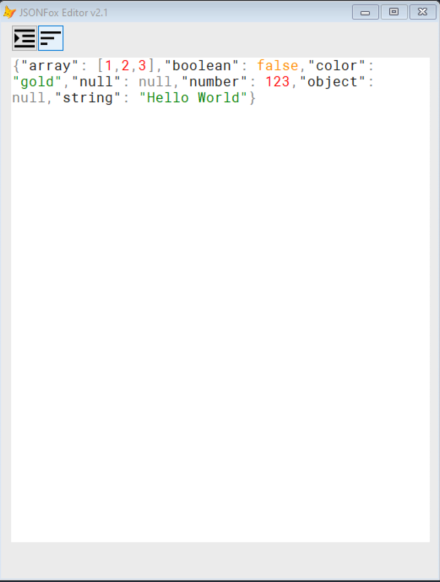JSONFox is a free JSON / XML parser for Visual FoxPro 9.0
Si te gusta mi trabajo puedes apoyarme con un donativo:
Gracias por tu apoyo!
Irwin Rodríguez (Toledo, Spain)
If you want to speed up the lexing process then you should use the JSONFoxHelper dll built in C# that scans the tokens faster. In order to use this scanner instead of the native one you just need to activate the NetScanner property like the example below:
// activate the property before using any routine from json class.
_Screen.Json.netScanner = .T.
_Screen.Json.Parse(myJSONString)I did a timing parsing a json file which size was 8mb. The native scanner lasts more than 15 minutes and the new scanner just 93 seconds. Pretty amazing isn't it?
Remember register the JSONFoxHelper.dll before using it. Check this article if you got stuck: https://stackoverflow.com/questions/7092553/turn-a-simple-c-sharp-dll-into-a-com-interop-component
- Faster Lexical Analizer
- I've optimised the string recogniser which is faster now.
- Special characters and Hex values should be faster
- Faster Parser
- The whole algorith has been rewriten and now creates a real array instead an object.
- Faster DATE and DATETIME recogniser.
- Faster JSON to cursor conversion
- Now it used sorted dictionaries instead of plain arrays
* Now you can use JSONFox as a compiled App...
Do LocFile("JSONFox", "app")
* Parse a string into an object.
MyObj = _Screen.Json.Parse('{"foo": "bar"}')
?MyObj.foo
**New** you may also parse any valid JSON string.
?_Screen.Json.Parse('"bar"') && bar
?_Screen.Json.Parse('true') && .T.
?_Screen.Json.Parse('false') && .F.
?_Screen.Json.Parse('null') && .NULL.
?_Screen.Json.Parse('1985') && 1985
* Convert Cursor into JSON string.
Create Cursor cGames (game c(25), launched i(4))
Insert into cGames Values('Pac-Man', 1980)
Insert into cGames Values('Super Mario Bros', 1985)
Insert into cGames Values('Space Invaders', 1978)
Insert into cGames Values('The Legend of Zelda', 1986)
?_Screen.Json.CursorToJson('cGames')
* Convert any cursor structure into JSON
?_Screen.Json.CursorStructure('cGames') _Screen.Json.CursorToJSON(tcCursor As String [, tbCurrentRow As Boolean [, tnDataSession As Integer]])
_Screen.Json.CursorToJSON(tcCursor As String [, tbCurrentRow As Boolean [, tnDataSession As Integer]]) tcCursor: the name of your cursor.
tcCursor: the name of your cursor. tbCurrentRow: ¿Would you like to serialize the current row? .F. as default.
tbCurrentRow: ¿Would you like to serialize the current row? .F. as default. tnDataSession: Provide this parameter if you're working in a private session.
tnDataSession: Provide this parameter if you're working in a private session.
* Sample 1: Serialize JSON String
Do LocFile("JSONFox", "app")
* Parse from string
Text To lcJsonStr NoShow
{
"name":"Irwin",
"surname": "Rodriguez",
"birth":"1985-11-15",
"current_year": 2019,
"wife": "Serelys Fonseca",
"music_band":"The Beatles",
"size": 1.79,
"isgamer": false,
"isprogrammer": true,
"hascar": null
}
EndText
obj = _Screen.Json.Parse(lcJsonStr)
* Don't forget check the LastErrorText
If _Screen.Json.lError
MessageBox(_Screen.Json.LastErrorText, 48, "Something went wrong")
Return
EndIf
?obj.name
?obj.size
* Deserialize and Indent
cJSONStr = _Screen.Json.Stringify(obj)
?cJSONStr
* Sample 2: JSONArray to Cursor
Text To lcStr NoShow
{
"status": "success",
"data": [
{
"id": 2,
"email": "rodriguez.irwin@gmail.com",
"name": "Irwin1985",
"lastName": "Rodriguez",
"sex": "1",
"salary": 2278.45,
"profesion_id": 1,
"birthDate": "1985-11-15",
"createdAt": "2019-03-31",
"single": true
},
{
"id": 3,
"email": "oscaraguero85@gmail.com",
"name": "oscar",
"lastName": "aguero",
"sex": "1",
"salary": 1500.45,
"profesion_id": 1,
"birthDate": "1985-06-18",
"createdAt": "2021-10-11",
"single": true
}
],
"code": 200,
"message": "success"
}
ENDTEXT
obj = _Screen.Json.Parse(lcStr)
* Make a copy of the internal array from obj.data
Acopy(obj.data, aEmployeeList)
* Now pass the aEmployeeList by reference with '@'
lcJsonArray = _Screen.Json.Encode(@aEmployeeList)
* Convert the JSONArray into VFP CURSOR **(this is cool)**
_Screen.Json.JSONToCursor(lcJsonArray, "qEmployees")
* Modify some fields
Select qEmployees
Replace salary With 5.000 In qEmployees
* Now serialize the cursor to JSON
cJson = _Screen.json.CursorToJson("qEmployees")
?cJson
* Sample 3: Stringify Example
cJson = '{"age":45,"birthdate":"1985-11-15","created":"2020-07-28 09:29:41 PM","fullname":"Jhon Doe","gender":"Male","married":true,"soports":["running","swiming","basket-ball"]}'
?_Screen.Json.Stringify(cJson)
Use Home(2) + "NorthWind\Customers.dbf"
?_Screen.Json.CursorStructure('Customers', Set("Datasession"), .T.)
// Function Signature
// CursorStructure(tcAlias, tnDataSessionID, tlCopyExtended)
// 1. tcAlias is the alias given.
// 2. tnDataSessionID is the current Datasession where Alias() lives (for private data sessions).
// 3. tlCopyExtended if .F. then copy FIELD_NAME, FIELD_TYPE, FIELD_LENGTH and FIELD_DECIMAL_PLACES.
// if is .T. then parse all the alias data structure. Text To lcStr NoShow
{
"array": [
1,
2,
3
],
"boolean": false,
"color": "gold",
"null": null,
"number": 123,
"object": null,
"string": "Hello World"
}
ENDTEXT
_Screen.Json.JSONViewer(lcStr)


